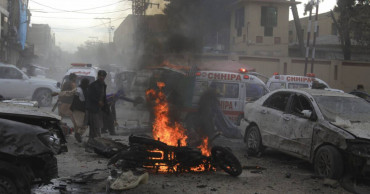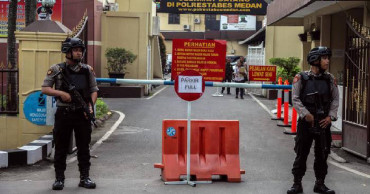Suicide bomber
Suicide bomber kills 59, wounds over 150 at Pakistan mosque
A suicide bomber struck a crowded mosque inside a police compound in Pakistan on Monday, causing the roof to collapse and killing at least 59 people and wounding more than 150 others, officials said.
Most of the casualties were police officers. It was not clear how the bomber was able to slip into the walled compound, which houses the police headquarters in the northwestern city of Peshawar and is itself located in a high-security zone with other government buildings.
Sarbakaf Mohmand, a commander for the Pakistani Taliban, claimed responsibility for the attack on Twitter. The main spokesman for the militant group was not immediately available for comment.
"The sheer scale of the human tragedy is unimaginable. This is no less than an attack on Pakistan,” tweeted Prime Minister Shahbaz Sharif, who visited the wounded in Peshawar and vowed “stern action” against those behind the bombing. He expressed his condolences to families of the victims, saying their pain ”cannot be described in words."
Pakistan, which is mostly Sunni Muslim, has seen a surge in militant attacks since November, when the Pakistani Taliban ended their cease-fire with government forces.
Earlier this month, in another attack claimed by the Pakistani Taliban, a gunman shot and killed two intelligence officers, including the director of the counterterrorism wing of the country’s military-based spy agency Inter-Services Intelligence. Security officials said Monday the gunman was traced and killed in a shootout in the northwest near the Afghan border.
Monday's assault on a Sunni mosque inside the police facility was one of the deadliest attacks on security forces in recent years.
The militant group, also known as Tehreek-e-Taliban Pakistan or TTP, is separate from but a close ally of the Afghan Taliban. The TTP has waged an insurgency in Pakistan in the past 15 years, seeking stricter enforcement of Islamic laws, the release of its members in government custody and a reduction in the Pakistani military presence in areas of Khyber Pakhtunkhwa province it has long used as its base.
More than 300 worshippers were praying in the mosque, with more approaching, when the bomber set off his explosives vest. Many were injured when the roof came down, according to Zafar Khan, a police officer, and rescuers had to remove mounds of debris to reach worshippers still trapped under the rubble.
Meena Gul, who was in the mosque when the bomb went off, said he doesn’t know how he survived unhurt. The 38-year-old police officer said he heard cries and screams after the blast.
Mohammad Asim, a spokesman at the main government hospital in Peshawar, put the death toll at 59, with 157 others wounded. Police official Siddique Khan the bomber blew himself up while among the worshippers.
Senior police and government officials attended the funerals of 30 police officers and arrangements to bury the rest were being made. Coffins were wrapped in the Pakistani flag their bodies were later handed over to relatives for burials.
Read more: Roadside bomb kills 6 people in north Afghanistan: Taliban
Peshawar is the capital of Khyber Pakhtunkhwa province, where the Pakistani Taliban have a strong presence, and the city has been the scene of frequent militant attacks.
The Afghan Taliban seized power in neighboring Afghanistan in August 2021 as U.S. and NATO troops pulled out of the country after 20 years of war.
The Pakistani government's truce with the TTP ended as the country was still contending with unprecedented flooding that killed 1,739 people, destroyed more than 2 million homes, and at one point submerged as much as a third of the country.
Mohmand, of the militant organization, said a fighter carried out the attack to avenge the killing of Abdul Wali, who was widely known as Omar Khalid Khurasani, and was killed in neighboring Afghanistan’s Paktika province in August 2022.
Afghanistan’s Foreign Ministry said in a statement that it was “saddened to learn that numerous people lost their lives and many others were injured by an explosion at a mosque in Peshawar” and condemned attacks on worshippers as contrary to the teachings of Islam.
Condemnations also came from the Saudi Embassy in Islamabad, as well as the U.S. Embassy, adding that "The United States stands with Pakistan in condemning all forms of terrorism.”
Cash-strapped Pakistan faces a severe economic crisis and is seeking a crucial installment of $1.1 billion from the International Monetary Fund — part of its $6 billion bailout package — to avoid default. Talks with the IMF on reviving the bailout have stalled in the past months.
Former Pakistani Prime Minister Imran Khan called the bombing a “terrorist suicide attack.” He tweeted: “My prayers & condolences go to victims families. It is imperative we improve our intelligence gathering & properly equip our police forces to combat the growing threat of terrorism.”
Sharif’s government came to power in April after Khan was ousted in a no-confidence vote in Parliament. Khan has since campaigned for early elections, claiming his ouster was illegal and part of a plot backed by the United States. Washington and Sharif dismiss Khan's claims.
3 years ago
2 dead as bomber hits Pakistan police protecting polio teams
A suicide bomber blew himself up near a truck carrying police officers on their way to protect polio workers outside Quetta on Wednesday, killing two people and wounding more than 20 others, mostly policemen, officials said.
Ghulam Azfer Mehser, a senior police officer, said the attack happened when the policemen were heading to the polio workers, part of a nationwide vaccination drive launched Monday.
He said the bombing also damaged a nearby car carrying members of a family.
The Pakistani Taliban in a statement claimed responsibility. In a statement, the Tehrik-e-Taliban Pakistan group, or TTP, said the attack in Baluchistan targeted police to avenge the killing of their former spokesperson, Abdul Wali. He was widely known as Omar Khalid Khurasani and was killed in a bombing in Afghanistan’s Paktika province in August. His death was a heavy blow to the group.
Read: Militants kill six police officers during ambush in northwest Pakistan
The attack on police came amid a spike in new polio cases among children. The latest vaccination campaign is the sixth such drive this year and will last for five days, aiming to inoculate children under the age of 5 in high-risk areas.
The drive is aimed at Islamabad and in the high-risk districts in eastern Punjab and southwestern Baluchistan province, where Monday's attack took place. It killed at least two people, including a police officer and a child. A similar campaign will be launched in the northwest in the first week of December.
Pakistani authorities have been launching such campaigns regularly despite attacks on workers and police assigned to inoculation drives.
Militants falsely claim that vaccination campaigns are a Western conspiracy to sterilize children. Since April, Pakistan has registered 20 new polio cases, which can cause severe paralysis in children.
Read: Former ISI chief named Pakistan's new head of army
Pakistan came close to eradicating polio last year, when only one case was reported.
Currently, Pakistan and Afghanistan are the last two countries in which polio has not been eliminated.
Wednesday's bombing happened two days after The Pakistani Taliban ended a monthslong cease-fire with the government in Islamabad, ordering its fighters to resume attacks across the country, where scores of deadly attacks have been blamed on the insurgent group. In Monday's statement, the outlawed TTP group said it would end the five-month cease-fire after the army stepped up operations against the TTP.
Pakistan and the TTP had agreed to an indefinite cease-fire in May after talks in Afghanistan’s capital. The Pakistani Taliban are a separate group but are allies of the Afghanistan Taliban, who seized power in Afghanistan more than a year ago as the U.S. and NATO troops were in the final stages of their pullout. The Taliban takeover in Afghanistan emboldened TTP, whose top leaders and fighters are hiding in Afghanistan.
Read: China crowds angered by Covid curbs openly urge Xi to resign
The latest violence comes a day after Pakistan’s new military chief, Gen. Asim Munir, took command.
Munir, a former spymaster, replaced Gen. Qamar Javed Bajwa after he retired from the post after a six-year term. Bajwa, during his tenure, had approved a series of operations against the militants in Baluchistan, northwest and elsewhere in the country.
The latest attack also comes a day after the military claimed it killed 10 “terrorists” in a raid in the Hoshab district of Baluchistan province. For nearly two decades Baluchistan has been the scene of a low-level insurgency by separatists demanding independence from the central government in Islamabad. The government says it has quelled the insurgency, but violence in the province has persisted.
3 years ago
Suicide bomb hits Palm Sunday Mass in Indonesia, 20 wounded
Two attackers blew themselves up outside a packed Roman Catholic cathedral during a Palm Sunday Mass on Indonesia’s Sulawesi island, wounding at least 20 people, police said.
A video obtained by The Associated Press showed body parts scattered near a burning motorbike at the gates of the Sacred Heart of Jesus Cathedral in Makassar, the capital of South Sulawesi province.
Rev. Wilhelmus Tulak, a priest at the church, said he had just finished celebrating Palm Sunday Mass when a loud bang shocked his congregation. He said the blast went off at about 10:30 a.m. as a first batch of churchgoers was walking out of the church and another group was coming in.
He said security guards at the church were suspicious of two men on a motorcycle who wanted to enter the building and when they went to confront them, one of the men detonated his explosives.
Also read: Twin suicide bombings rock central Baghdad, at least 32 dead
Police later said both attackers were killed instantly and evidence collected at the scene indicated one of the two was a woman. The wounded included four guards and several churchgoers, police said.
The attack a week before Easter in the world's most populous Muslim-majority nation came as the country was on high alert following December's arrest of the leader of the Southeast Asian militant group, Jemaah Islamiyah, which has been designated a terror group by many nations.
Indonesia has been battling militants since bombings on the resort island of Bali in 2002 killed 202 people, mostly foreign tourists. Attacks aimed at foreigners have been largely replaced in recent years by smaller, less deadly strikes targeting the government, police and anti-terrorism forces and people militants consider as infidels.
President Joko Widodo condemned Sunday’s attack and said it has nothing to do with any religion as all religions would not tolerate any kind of terrorism.
Also read: Big suicide bombing in Kabul kills 18 at education center
“I call on people to remain calm while worshipping because the state guarantees you can worship without fear,” Widodo said in a televised address.
He offered his prayers to those injured and said the government would cover all costs of medical treatment. He said he had ordered the national police chief to investigate the attack and crack down on any militant network that may be involved.
At the end of Palm Sunday Mass in St. Peter’s Basilica, which opened Holy Week ceremonies at the Vatican, Pope Francis invited prayers for the victims of violence. He cited in particular “those of the attack that took place this morning in Indonesia, in front of the Cathedral of Makassar.’’
At least 20 people were wounded in the attack and had been admitted to hospitals for treatment, said Mohammad Mahfud, the coordinating minister for political, legal and security affairs.
“The perpetrators or terrorist groups behind this attack will continue to be pursued,” Mahfud said.
Indonesia's National Police spokesperson Argo Yuwono said police were still trying to identify the two attackers on the motorbike and whether they were linked to a local affiliate of the banned Jemaah Islamiyah network or were acting independently.
Also read: Suicide bomber in SW Pakistan kills 8 at Islamist rally
Indonesian forces in December arrested the group's leader Aris Sumarsono, also known as Zulkarnaen. Over the past month the country's counterterrorism squad has arrested about 64 suspects, including 19 in Makassar, following a tipoff about possible attacks against police and places of worship.
While Jemaah Islamiyah has been weakened over the past decade by a sustained crackdown, in recent years a new threat has emerged in militants who fought with the Islamic State group in Iraq and Syria and returned to Indonesia or those inspired by the group’s attacks abroad.
Indonesia's last major attack was in May 2018, when two families carried out a series of suicide bombings on churches in the second-largest city of Surabaya, killing a dozen people including two young girls whose parents had involved them in one of the attacks. Police said the father was the leader of a local affiliate of the Islamic State group known as Jemaah Anshorut Daulah.
4 years ago
Suicide bomber in SW Pakistan kills 8 at Islamist rally
A powerful suicide bombing killed eight people and wounded 16 others in Pakistan's restive Baluchistan province on Monday, local police said, when it struck an Islamist rally in the regional capital.
5 years ago
Suicide bomber attacks Indonesian police station, injuring 6
Police say a suicide bomber has blown himself up at a busy police station in Indonesia's third-largest city, injuring at least six people.
6 years ago


.jpg)





